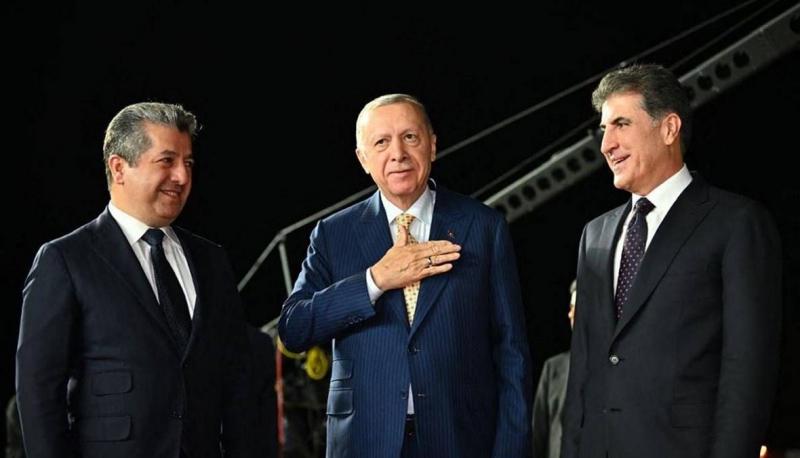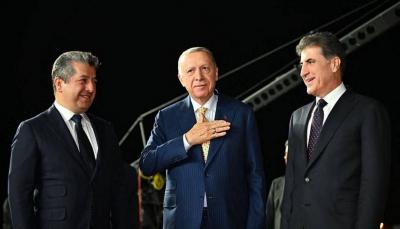Turkish President Recep Tayyip Erdoğan's visit to Iraq carried significant implications for the beginning of a new phase of cooperative relations between the two neighboring countries at the levels of security, economy, trade, and development, with a shared approach to water and energy issues. The composition of the accompanying delegation during Erdoğan's visit to both Baghdad and Erbil highlighted the nature of the files that the countries have been working on in recent months, as it included the ministers of foreign affairs, defense, interior, transportation, infrastructure, energy, trade, agriculture, forestry, industry, and technology, in addition to the president's senior advisor for foreign policy and security, Akif Çağatay Kılıç.
### Mutual Visits
On the eve of the visit, Turkish Foreign Minister Hakan Fidan stated that more than 20 agreements would be signed with Iraq during this visit, marking the first visit by a Turkish head of state in 15 years, following former President Abdullah Gül's visit to Baghdad in 2009, and Erdoğan's first visit in 13 years since he was prime minister, during which he made three visits to Iraq in 2008, 2009, and 2011. Fidan said, "Our goal is to develop relations with Iraq so that regional stability, prosperity, and development become possible, institutionalizing our relations, and doing our best to enhance the system and prosperity in the region."
He emphasized the long-standing collaborations between the two countries in areas such as security, energy, water, agriculture, health, and education, saying, "We have completed preliminary agreements to sign more than 20 agreements during Erdoğan's visit." Fidan underscored the importance of economic development and political stability in Iraq, expressing a desire for the region and Iraq to be associated with stability rather than internal upheavals, conflicts, and wars. He believed that Turkish-Iraqi relations could serve as an important model for the region, especially in light of the ambitious "Road to Development" project that Erdoğan prioritizes.
### Key Issues Including Security
Following his arrival in Baghdad, Erdoğan met President Abdul Latif Rashid, then held discussions with Prime Minister Mohammed Shia al-Sudani, followed by an expanded meeting with delegations from both countries. Experts have identified security and economy as the two most critical dimensions of Erdoğan's visit to Iraq, stressing the importance of joint efforts in security between the two nations for the region.
Security and anti-terrorism expert, Joşkun Başbuğ, noted three main factors that underscore the visit's significance. The first is the "Road to Development" project, which needs to be implemented swiftly amid the emergence of alternative projects. The second is the agreement to cooperate on securing Turkey's southern borders and the establishment of a joint Turkish-Iraqi operations center, emphasizing that Turkey has been working on this issue for an extended period but that recent developments in the region due to the Gaza War have made it more urgent.
He added a third factor regarding the potential withdrawal of U.S. forces from the region, which urges Turkey to act quickly to cover the emerging gaps in the area. Regarding the Road to Development, Turkish Minister of Transportation and Infrastructure Abdulkadir Uraloğlu noted that upon completion of the project, which traverses Iraq and Turkish territory, the duration for transporting goods between the region and Europe would be reduced to 25 days.
He pointed out that shipping through the Suez Canal takes 35 days and through the Cape of Good Hope over 45 days, while the Road to Development will cut the time down to 25 days. He added that the first phase of the project is set to be operational next year, outlining plans to build 1,200 km of railways and highways, along with energy transmission and communication lines as part of the project, and that a railway line will be established from the border village of "Ovaköy" in southeastern Turkey to Europe, ensuring that national and international transportation projects are of vital importance to Turkey.
Uraloğlu noted that the Road to Development is progressing faster than expected, with significant advancements being made through monthly mutual visits between the two nations.
### Water Issues Between Iraq and Turkey
On the water issue, Durson Yildiz, head of the Water Policy Association in Turkey, stated that Iraq meets most of its water needs from the Tigris and Euphrates rivers, which originate in Turkey. He mentioned that Iraq has repeatedly requested the release of more water from the Tigris River during dry periods, and Turkey has consistently responded positively, having postponed the operation of the Ilisu Dam on the Tigris River three times at Iraq's request. He added that with the increasing impact of climate change, using water more efficiently in Iraq is imperative, as all reports regarding climate change in the Euphrates and Tigris basins indicate a significantly worsening water scarcity by 2050, making water management exceedingly difficult.
Yildiz highlighted that for this reason, issues of water, akin to security and energy, are at the forefront of Erdoğan's agenda in Iraq. Turkey has long sought to assist in developing various projects in Iraq aimed at using water efficiently and reducing water losses, and is prepared to guide the private sector in Iraq regarding water-saving irrigation systems and equipment, organizing training and practical programs for Iraqi irrigation engineers and technicians.
### Concerns Over Iranian Interventions
Columnist for the pro-government newspaper "Hürriyet," Abdulkadir Selvi, asserted that Turkish-Iraqi relations are developing positively and are on track to become a regional model. According to Turkish Foreign Minister Hakan Fidan's definition, relations between the two neighboring countries will embody "a vision for regional development." Selvi indicated that both countries are not only discussing the fight against terrorism and the Kurdistan Workers' Party (PKK) but are also collaborating based on a regional vision of shared development, with the decision to establish joint ministerial committees in areas of trade, agriculture, energy, water, health, and transportation.
He said, "In our region, known for terrorism and civil wars, the goal is to make prosperity and development a common denominator. If this concept succeeds between Turkey and Iraq, the aim will be to include Iran, and Iran's integration is crucial, though I fear it may disrupt such plans."
### Major Operation Against the PKK
Selvi also noted that a significant point of Erdoğan's visit to Iraq is the "grand operation in Iraq" against the PKK, stating that Baghdad has not classified the PKK as a terrorist organization but as a "prohibited organization," a step awaiting parliamentary approval. He added, "The concept of this operation will be different, as Turkey plans to implement it in conjunction with the central Baghdad government, the Erbil administration, and the Popular Mobilization Forces (PMF), with Turkish forces executing the operation on the ground, supported by air power to establish a secure line (a buffer zone) 30 to 40 kilometers deep from our 378-kilometer border with Iraq."
He continued, "Attacks on Turkish bases in the 'Claw-Lock' operation areas in northern Iraq on December 22-23 and January 24 made the establishment of the buffer zone unavoidable." Selvi, citing informed sources, mentioned that when the operation begins, control over the Iraqi-Syrian border will also be established simultaneously, preventing the PKK from transferring its leadership from Iraq to Syria, a task slated for the central Baghdad government and the PMF, with Turkey providing technical support.
### A Message to Pavel Talabani
The sources also indicated that actions would be taken against the PKK in Sulaymaniyah, Sinjar, and the Makhmour camp, with Baghdad and Erbil providing intelligence support during this phase, working against potential threats emerging from Sulaymaniyah, controlled by the Patriotic Union of Kurdistan (PUK) led by Pavel Talabani.
Selvi noted that the Barzani family had strongly insisted that President Erdoğan visit Erbil, and Erdoğan agreed, indicating there is support from Erbil's administration for cooperation with Turkey, but there is also a message to the PUK and Pavel Talabani regarding the ongoing collaboration with the PKK in Sulaymaniyah, signifying that "Turkey is a country that instills confidence in its friends and fear in its enemies."




